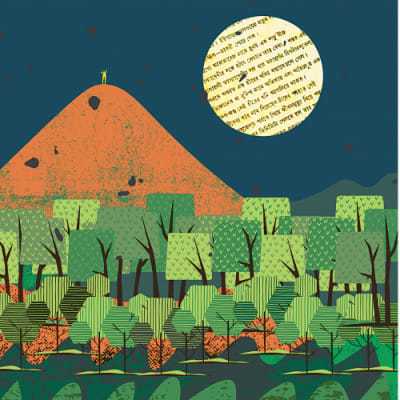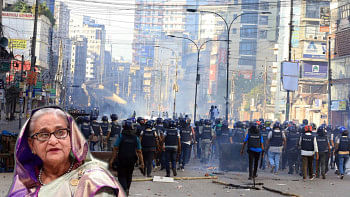Bibhutibhushan, an unlikely adventurer

For anyone sitting through heat-stricken afternoons on forever-long summer days, reprieve can come in the form of escape into a fictional world, and Bibhutibhushan Bandyopadhyay is a master at offering it. He is a magician with words, luring the reader in from the get-go. While early 20th century Bangla literature focused on domestic life and socio-political struggles, boasting work from luminaries such as Manik Bandyopadhyay (Putul Nacher Itikatha, Padma Nadir Majhi) and Sarat Chandra Chattopadhyay (Srikanta, Parineeta), Bibhutibhushan Bandyopadhyay broke away from the norm and placed some of his protagonists right in the core of untamed nature.
Two of my personal favourites are Chander Pahar (1937), often categorised as a young adult novel but perfect for anyone who loves a good adventure-thriller, and Aranyak (1939), a story about a metropolitan man falling in love with the wild, discovering innumerable facets of life in the process. The former is set in the beginning of the 20th century, before World War I. The protagonist Shankar, in search of excitement beyond his lacklustre job in West Bengal, ends up as a stationmaster at a remote railway station in Uganda. Through a chance encounter he embarks on a danger-laden journey into the unknown heart of the Richtersveld mountains in search of a fabled diamond mine. What appears to be a nerve-wracking adventure on the surface is a story essentially about resilience and an indomitable spirit, compelling the reader to reflect on their own desires and their pursuit of it.
Aranyak, more relaxed in tone and pace, is set in the 1920s. A city man through and through, the protagonist leaves urban life for the forests of Bihar to manage the zamindari estate of a friend. He becomes enticed by the beauty of the wild—the woods, the animals, and the people. The novel thenpaints the picture of a man becoming one with the forest, and in great irony, ultimately becoming instrumental in its destruction and its way of life. The poetic language and rich descriptions of nature offer an insight into the lives of locals who coexist with their landscape—the poor Brahmins, Gangots, Santals, the rich Rajput overlords, and legends of the gods of the forest who carefully guard their realm. The god Tarbaro protects wild bison from being hunted in these jungles, and the protagonist laments the absence of the god when bison are trapped in city slaughterhouses. Perhaps the gods lose their powers when removed from their homes.
There is something about the nostalgia these books evoke for a time that no longer exists and neither do the places, in the way they used to. Both these novels also serve as a commentary on our ideas of civilisation and propriety, inherited from our colonisers, questioning the ethics of imposing such ideas on cultures that have survived for thousands of years on their own. Bandyopadhyay's strongest attributes are his vivid descriptions and flowing language. The reader is entirely transported into the world where the events of his stories occur, and there is never a dull moment. During a summer such as this when we must stay confined to the spaces of our homes, we could make use of delving into these classic Bangla masterpieces where our minds can roam free on the desert mountains of Africa or the long-gone forests of Bihar.
Moneesha R Kalamder is an Economics grad and editor-in-chief at Rantages. She reads everything and mostly writes comedy. Reach her at [email protected]

 For all latest news, follow The Daily Star's Google News channel.
For all latest news, follow The Daily Star's Google News channel. 



Comments